- Home
- Anne Rivers Siddons
Colony Page 12
Colony Read online
Page 12
“And up and married her so soon,” Gretchen said, laughing lightly. “Do you by chance have some news for us, Maude?”
“News?” I said, and then understood. “Oh. No. Of course not. At least, I don’t think so….”
Gretchen Winslow always could make me stammer.
“Well, soon, I’ll just bet,” she said, and dismissed me with her eyes and went back to Peter. “Listen, darling, I can’t stay; that silly Nola didn’t show up this morning, and the children are alone in the cottage. Burdie took his mother and father and Erica Conant over to the Sternhagens’ house party in Northeast Harbor yesterday and can’t get the boat back out of the harbor. Not that he’s tried. So I’m all by myself with the wee ones until at least tomorrow. I know it’s unpardonable gall, but I wonder if I could borrow you for a few minutes this afternoon or evening? Little Freddie put his turtle in the toilet, and it sounds as though it’s done something to the pump, and you know how I am about those things…. Maude, my dear, you wouldn’t mind, would you? I’ll send him home immediately with some of my toll house cookies. He used to love them.”
“I don’t mind at all,” I said, hating her. Even if she had not been beautiful and arrogant and insinuatingly familiar with my husband, I would have hated her. It was as purely a chemical thing as I have ever felt, that first flare of enmity toward Gretchen Winslow. I knew she felt it too. You could see it in the chameleon-green eyes. If you looked at her closely you could tell that she was a good five or six years older than Peter. I thought, spitefully, that she was probably much nearer thirty than she wished to be thought.
“Then I’ll see you later, Peter?” she said.
“Yeah…sure.”
“ ’Bye, then, sweetie. ’Bye for now, Maude. I’m sure I’ll be seeing lots and lots of you.”
“Depend on it,” I said to her retreating back between clenched teeth.
“Listen, Maude,” Peter began, but the last guest of the morning came up and gave him a sharp poke in the ribs, and he turned and caught her up and swung her around, laughing with pleasure. This time I laughed too.
She was very small, almost a midget, I suppose, and nearly perfectly round, and she looked as if she had been clothed by standing still in a room while people hurled cast-off garments at her. I never saw such an untidy woman. Nothing matched; everything trailed. Peter put her back down and I realized that I had seldom seen such a fat one either, at least for her height. Her flesh hung in pink folds and quivered and lapped and surged when she moved. Oddly, it was not, as it might have been, repulsive. Her smile was so open and delighted, and her laugh so young and free, and her blue eyes shone so, that nothing else about her, even the unmistakable traces of breakfast egg on her shawl, made any difference at all. I found myself wanting to reach out and touch her, as you would a pretty baby or a winsome pet.
“I’m Carlotta Padgett. Lottie,” she said to me, and then I realized she was quite old but did not seem so because of the stretched, shiny pink skin. “I know you’re Maude, and I wanted to come and tell you how glad we are to have you in Retreat. And my dear, how sorry I am about the fawn, too. It was a very brave thing you did, and I hope this nice boy is proud of you.”
She looked at Peter.
“Yes,” he said, startled. “I am proud of her.”
“Then you tell her so. I’ll bet you haven’t,” Lottie Padgett said. “And it’s a sure thing that nobody else is going to. Listen, you pretty child, when they let you up off that silly chaise you come down to the Little House—that’s what it’s called—across the cove down there just under the Aerie, and let me get to know you. The kettle’s always on, and there’re always kittens and a puppy or two, and right now there’s a baby raccoon I’m trying to raise. Some idiot shot its mother; I found it when I was picking mushrooms over on Osprey Head the other day. You are from the river swamps, I hear, and I’m from the piney woods, and I know a fellow animal lover and a wild heart when I see one. You come, now. There’s lots I can tell you about Retreat that you need to know.”
And before we could answer she was gone in a scuttle of skirts and a flip of draperies, trailing the thick scent of mothballs. Several people tried to stop her for conversation, and Peter’s mother waylaid her in the door with doughnuts and coffee, but she waved them aside, shouted something over her shoulder cheerfully, and was gone out into the fog with a thud of the front door before I could draw a deep breath.
I looked at Peter. He was grinning after her.
“Did I dream that?” I said.
“No. She’s the realest woman I know,” he said. “Well, well. Lottie Padgett came to see you. You have been singly honored. Do you know, Maude, I don’t think she’s been in this house or many others in all the years I’ve been coming to Retreat? She lives down there on the shore in that little wreck of a house like a hermit, and talks mainly to the animals, and picks mushrooms and berries and stuff, and takes in strays and hurt birds and whatever, and nobody over the age of sixteen is ever invited in. But under that…God, her house is full of kids from dawn to dusk, all summer long. She’s an absolute Pied Piper. I just flat loved her when I was growing up.”
“Is she terribly poor?” I said.
“God, no. She’s terribly rich. Her husband inherited oil wells, plural, in Oklahoma, which is where they were born, and brought her up here to visit a college friend—I think it might have been Sykes Conant, when he and Erica were first married—and she fell in love with the cape and the woods and made him build her that little doll’s house down there. They had one son, the feckless Frankie, who is, I think, an Episcopal minister somewhere in California now. He was always ashamed of his mother. A real shit heel, was Frankie. He never married; I think he was, as they say in England, a bit of a poof. I don’t think he’s been up here since he left divinity school. Claude died about fifteen years ago. Except that she promptly gave a pile of money to start an animal shelter for the county over in Castine, I don’t think Lottie has changed anything since she first came here. I know she’s never bought any new clothes or furniture for the house. It looks like an animal pen. Which, for all practical purposes, it is.”
“Do you still visit her?”
“I still do. Don’t tell on me, though. She usually cuts you off when you reach sixteen.”
“Well,” I said, “I’d like to go. I liked her a lot. She’s the only one who seems to care about that poor little fawn.”
“I cared about it,” he said gravely. “Do you think it pleased me that Micah had to shoot it? I was just so worried about you I forgot to say anything about it. You should go and see her; her friendship is a great honor. Only I wouldn’t let Mother know, if I were you. She thinks Lottie is unsanitary, and crazy to boot.”
“And do you?”
“Oh, yeah, no doubt about it. Both those things. But I love her for things other than her hygiene and her mental health. She has the gift of a purely loving heart. Sometimes I think that’s a pretty rare thing in Retreat.”
I looked at him in surprise. He smiled uncomfortably.
“I love this place,” he said. “It’s everything I ever knew of freedom and childhood and wildness. But it’s a very small place. And its focus is very narrow. It’s like a microscope: if you aren’t careful, it can catch light from the sun and burn you. I’d be a fool not to know that.”
“Peter, don’t let it burn me,” I said impulsively.
“Stick with me, lady,” he said out of the corner of his mouth. “I’ll see ya git home safe.”
Soon after the last guest left I was upstairs in bed, deep under Princeton and Hudson Bay, fighting sleep. Peter fiddled restlessly about the room, staring out at the fog.
“You think you’ll sleep?” he said. “You should; that siege must have exhausted you. I think I’ll go over to Willis’s and see if Old Micah’s got his winch fixed yet. I’ll be back before you wake up.”
“Why don’t you?” I said drowsily. “And are you going to go over to Gretchen Winslow’s?”
&nbs
p; He looked back over his shoulder at me. The strange, pearly fog light washed his fair hair to silver and put metallic planes on his high cheekbones. I really loved looking at Peter.
“Would you mind? It’s bad business to be up here with no plumbing and two small children. I ought to see if I can get the turtle out, anyway.”
“She usually gets what she wants, doesn’t she?” I said, disliking my own tone.
He chuckled. “Winslows usually do. Been here longer than anybody but the Indians and some of the natives. Gretch’s forebears came from Massachusetts around sixteen hundred something. She’s one of the few colony women who has long ties on both sides. Sometimes she pulls rank a little. I won’t go if you don’t want me to.”
“No,” I said, burying my face in the pillow. “You do what you want to. I’m not going to start ordering you around, too.”
I waited to see what he would say, but he said nothing, and I was asleep before he left the room. When I woke, the lamps were lit and the white fog had turned to black, and Mother Hannah was just coming into the room with a supper tray for me. Peter was behind her, his hair still wet with fog droplets, curling around his face. On the tray, beside the inevitable hot medicinal chowder and the rolls and butter, was a small plate of fresh toll house cookies.
“Did you find the turtle?” I said to Peter. He looked blank, and then said, “Oh. No. I didn’t go over there. I stopped at Micah and Tina’s and asked Micah to go. I couldn’t have done anything about the damned turtle if I’d found it anyway.”
Mother Hannah looked sharply at him. “You didn’t go over to Gretchen’s, after she asked you to? Really, Peter. You can’t just send a strange man into the home of a young woman alone; what on earth must she think of you? I thought you’d brought the cookies. I found them on the table.”
“I guess she brought them over herself,” Peter said, taking one and biting into it. “Hmmm. A mite dry. Gretch is losing her touch. Relax, Ma. Micah Willis is hardly a stranger. And he’s been fixing colony crappers since he was sixteen; you know that. I’d have been a waste of time; she’d have had to get Micah in the end, anyway.”
“You know what I mean,” Mother Hannah said crisply, and turned and left the room. We both looked after her.
“I do, if you don’t,” I said, grinning. He grinned back.
“Well, you know. I think Ma always thought there might be something between Gretch and me. More of a merger than a relationship, I guess. The Winslows are stinking rich, and older than the Chamblisses by half a century. And they’ve always pretty much run the colony. Ma would love a crack at that. Freddie Winslow inherited the family merchant bank in Manhattan, and Burdie, Gretch’s husband, will inherit it in turn.”
“Your family has one of its own,” I said. “Why does she care about theirs?”
“Well,” he said, leaning over and unbuttoning the top button of my nightgown, “their bank is bigger than our bank. Feeling pretty good, aren’t we?”
“What’ll you give me to find out?” I said, drawing his damp head down to my breast. “But you know, I’m a little surprised that your mother cares about bettering her social position. That’s not exactly high-minded. Ouch, Peter. That hurts.”
He climbed into bed with me and drew the covers up over both our heads.
“She doesn’t think of it as social climbing. To her it’s keeping the bloodlines pure, or something. Ensuring suitable grandchildren. She’ll back off once she has her own grandchild to spoil. Why don’t we see if we can accommodate her, starting…right now?”
And we did.
“Peter?” Mother Hannah called up the stairs. “Is Maude all right? I thought I heard her fall….”
The fog burned off the next day, and a spell of glittering, blue-edged days rolled in from the bay. Peter got the Hannah into the water at last and took to the sea like a gull, along with every other man in Retreat who was old enough…or not too old…to sail. When they came off the water, they flocked to the tennis courts; I could hear the twang of tennis balls, and shouts and applause, from the downstairs sun porch, where Mother Hannah allowed me to sit in the mornings, wrapped in afghans, sorting linens and copying out old family recipes for my own household file. I knew that I would make few of the creamy, molded, and bombed things she thought suitable for brides’ recipe files, but it kept her out of my venue, and in a day or two she seemed satisfied that I would not make a break for the water and commit some new outrage in her absence and began her morning round of calls and food-gathering again.
Big Peter was gone from morning till dusk that week, over on Rosier Pond, where the Chamblisses had a small cabin, cataloging his birds and sketching small creatures and writing in what Mother Hannah called his log and staring into God knows what dark, still recess of his own soul. In the few days we had been in Retreat, he had seemed to fade like ink script in the sun. I felt vaguely uneasy about him but no one else seemed to, and his absence meant I had the cottage to myself in the mornings. Christina Willis invariably accompanied Mother Hannah on her nuts-and-berries tours. I came to treasure those mornings as I have few others in Retreat. It was then, in those still first days, that the colony gave me its first and best gift, that humbling, rapturous, worldless sense of sea and sky and solitude. I still cannot really feel it unless I am alone.
But on the fourth morning I was beginning to fret from inactivity and sheer loneliness. I felt I had not seen Peter in daylight for a very long time. I was forbidden by both Dr. Lincoln and Mother Hannah to go out for another day or so, and Amy was incarcerated, that week, with her mother-in-law’s house guests. I pulled out my sketch pad and messed about with charcoal sketches of the bay and the lane from the windows, but they were airless and stale; it was the real thing I wanted. I wandered into the living room and pulled an old volume of Sarah Orne Jewett from the bookcase, but the light in the room was so dim from the great old lilac trees pressing against the windows that I could not read. They were in full bloom, overwhelming clouds of white, so fragrant in the fog-damp air that you could literally taste their sweetness as well as smell it. I loved the smell; it brought that first magical night on Wappoo Creek stingingly alive, with a poignance that brought tears to my eyes. I thought I might, later, go out and pick a bouquet for our bedroom.
“What a long way from home I am,” I said aloud. Only the untasted silence of an alien place answered me.
Just then the bushes outside the window began to thrash and shake violently, as if in a storm, and white blossoms began to rain down into the flower border and onto the lawn. I stood, staring; in a moment the room lightened and I found myself looking into the dark face of Micah Willis. He held a great pair of shears in his hand, and seeing me he touched his hand to his forehead and went on trimming. I hesitated; I had not seen him since he had pulled me from the sea on the day of the fawn and knew that my thanks to him were long overdue. I had tendered them to Christina, and she had smiled and said he was glad he got there in time; but I knew I should have written him a note. For some reason, I was embarrassed. The feel of his bare arms was still somehow warm on mine.
I went out the front door into the June sunshine, blinking like a cave creature. He had finished the trees on the left side of the doorstep and moved over to those on the right. The lawn was mounded with blossoms, like a summer snowfall. The cool air resonated with fragrance. A small boy, I thought about five or six, dark and vivid, apple-cheeked, gathered up armfuls of white branches and staggered with them to a mud-spattered Ford truck parked in the driveway and dumped them into the open bed, leaving a trail of white behind him. When I shut the screen door, man and boy stopped what they were doing and looked at me.
“I wanted to thank you for the other day,” I said, hearing in my own ears the cloying syrup of the Low Country and thinking it must sound torturous to ears accustomed to crispness. “I should have sooner, but no one would let me outside. I feel like a runaway prisoner out here now.”
He looked at me politely, the shears at the ready. The li
ttle boy came to stand solemnly at his knee, staring at me with his father’s black eyes.
“Anyone would have done the same,” he said. His voice was as low as I remembered, flat and uninflected.
“I hope you didn’t…catch cold or anything,” I said, knowing in despair that I was going to chatter. “That water is like nothing I’ve ever felt.”
“Reckon it would take more than a dunkin’ in the bay to give me a cold,” he said, and the little boy giggled. I looked down at him and smiled.
“I’m Mrs. Chambliss,” I said. “Who are you?”
“No, you ain’t, then,” the child piped, and Micah Willis did smile then, a flicker of white in the brown skin.
“The only Mrs. Chambliss he knows is your mother-in-law,” he said. “Seems to him there’s a mite of difference. This is Caleb Willis, my youngest and so far only. Say good morning to Mrs. Chambliss, Caleb.”
“Good morning,” the little boy said, staring at me. His eyes widened. “Daddy, she’s the lady with the fawn, isn’t she?”
“Yes,” I said. “I’m the lady with the fawn.”
I asked Micah Willis with my eyes if his small son knew about the fawn, and he nodded.
“Caleb knows I had to put the fawn down,” he said. “He’s as sorry as I am about it. You too, I expect. I told him you fell in tryin’ to get her out.”
“Her…?”
“Little doe,” he said.
He said no more, only stood there holding his shears, with his other hand on the top of his son’s head, obviously waiting for me to go back inside and let him get on with his task. Instead, I said, “What are you going to do with all those lilacs?” and pointed to the truck bed.
His face froze. Not a muscle moved, but somehow it seemed to harden as concrete will.
“Mrs. Chambliss senior said it was all right to take them,” he said.
“We gon’ put ’em on the ’cesters,” Caleb said helpfully. He looked from his father to me.
“Oh, please, I didn’t mean I thought you were…taking them,” I cried, reddening. “I just wondered what you would do with them—”

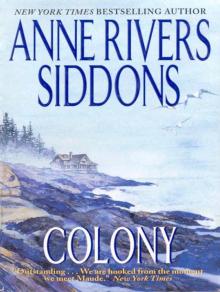 Colony
Colony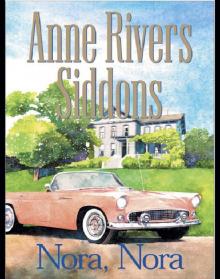 Nora, Nora
Nora, Nora House Next Door
House Next Door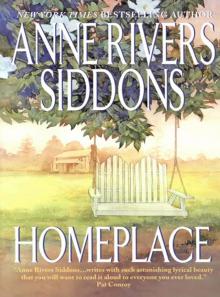 Homeplace
Homeplace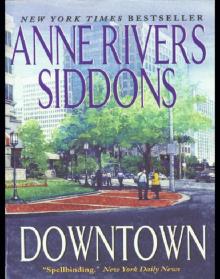 Downtown
Downtown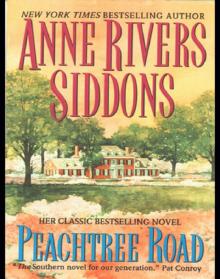 Peachtree Road
Peachtree Road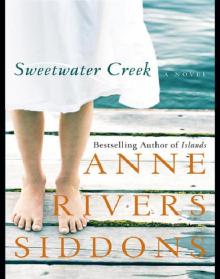 Sweetwater Creek
Sweetwater Creek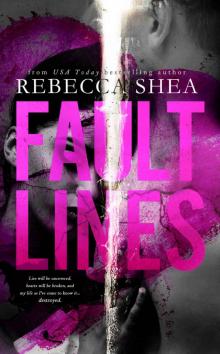 Fault Lines
Fault Lines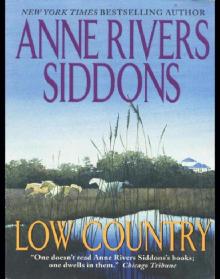 Low Country
Low Country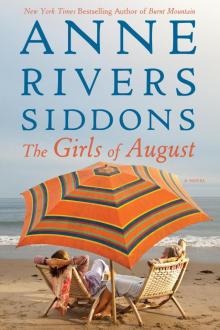 The Girls of August
The Girls of August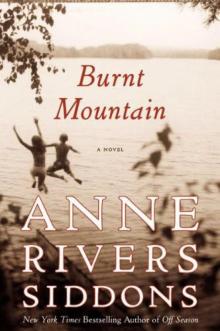 Burnt Mountain
Burnt Mountain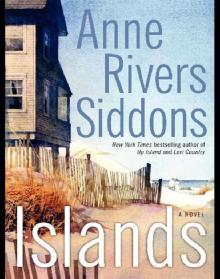 Islands
Islands